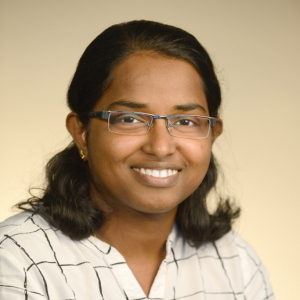
Felicia Michael
Connect
mfeliciamary@uky.eduPositions
- Postdoctoral Research Scholar
College Unit(s)
Other Affiliation(s)
- SCOBIRC - Post-Doctorates
Biography and Education
Education
Felicia Michael is a Postdoctoral scholar working on developing spinal cord injury repair strategies under the mentorship of Dr. Alexander Rabchevsky at the Spinal Cord & Brain Injury Research Center (SCoBIRC) in the University of Kentucky. She graduated with a B.Sc in Zoology and Biotechnology from Stella Maris College and M.Sc in Biomedical genetics from the University of Madras, India. She joined Dr. Sankar Venkatachalam in the University of Madras for her graduate program and worked on multiple projects including transplanting mesenchymal stromal cells and probing various gene manipulation strategies to delineate the factors affecting cell survival after spinal cord injury. Finally she defended her thesis entitled "Prospects of gene therapy for spinal cord injury: An experimental study using siRNA and viral vectors as tools for gene manipulation in a rodent model of contusion spinal cord injury" in 2018. After her Ph.D she joined Dr. Rabchevsky’s lab in the University of Kentucky as a postdoctoral scholar to undertake research on autonomic and mitochondrial dysfunction after SCI. She is currently working on a project entitled "Chemogenetic Silencing of Interneurons to Modulate Autonomic Dysreflexia" funded by the Craig H. Neilsen Foundation.
Research
My research interests center on the impediments to regeneration and repair following spinal cord injury (SCI). I was first introduced to the field during my Ph.D. wherein I used gene manipulation strategies to delineate the factors affecting cell survival after experimental SCI, which further piqued my interest in unraveling the complexity of gene editing in SCI. Therefore, after my thesis defense, I joined Dr. Rabchevsky’s lab as a postdoctoral scholar to undertake research on autonomic and mitochondrial dysfunction after SCI. He is a pioneer in the field of preserving mitostasis and autonomic dysreflexia (AD), among other SCI secondary disorders. Under his able guidance and expertise, I am addressing the underlying factors that contribute to the pathophysiology of AD using viral vectors with funding from Craig H. Neilsen Foundation. I am currently involved in employing telemetric hemodynamic studies in colorectal distention to induce AD and delineate the neuronal circuits contributing to its pathophysiology especially the role of interneurons. I am also conducting electromyography in rats with sacral SCI induced tail spasticity following oligoneucleotide mediated modulation of posttranscriptional gene splicing of 5HT2C receptors and evaluating the changes in gene expression after SCI using qPCR. Moreover, I am also working with his colleague, Dr. Samir Patel, who is an expert in the field of mitochondrial bioenergetics, with whom I am now probing mitochondrial transplantation strategies for contusion SCI.